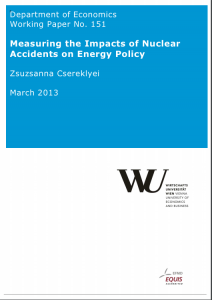Full Title: Measuring the Impacts of Nuclear Accidents on Energy Policy
Author(s): Zsuzsanna Csereklyei
Publisher(s): Vienna University
Publication Date: March 1, 2013
Full Text: Download Resource
Description (excerpt):
This paper examines the history of nuclear energy, safety developments of reactors and nuclear energy policy from the 1950s on. I investigate the effects of nuclear accidents on energy policy with the help of a panel dataset of 31 countries from 1965-2009, using annual data about the capacity of reactors under construction, primary energy consumption, as well as three nuclear accidents scaled INES five or higher by the International Atomic Energy Agency. After determining the extent of the accident impact in the different countries, I find that neither Three Mile Island nor Lucens had a worldwide negative effect on construction starts, while Chernobyl did. The effect of Chernobyl is however shown to wear-off in certain geographical clusters, after ten to thirty years. I find that nuclear capacity enlargement shows a significant persistence, but it was also driven by primary energy consumption in the past five decades. The effects of real interest rates, inflation, or gross domestic product on reactor construction were not found significant. Thus, an accident is likely to have a negative and long lasting impact in the country where it happened, and possibly in countries affected by the direct consequences, or where governments are subject to severe public pressure. It is difficult to estimate the consequences Fukushima is going to have on worldwide power plant constructions, but areas closer to the accident might be affected more negatively and for a longer time. Growing concerns of energy supply security and greenhouse gas emissions may counteract this impact at the legislative level.
